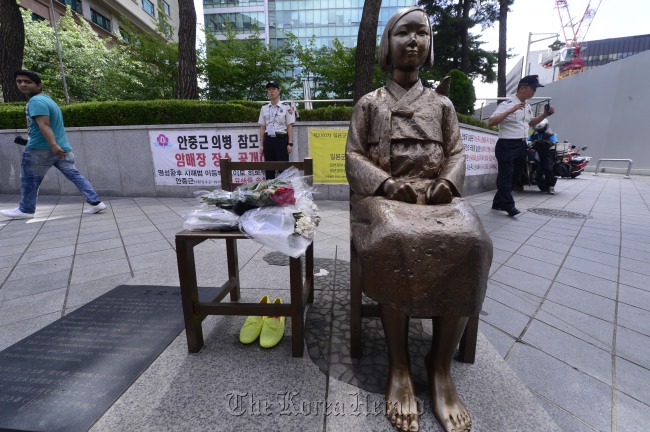[Newsmaker] Peace Statue, symbol of Japan’s wartime atrocities
By Korea HeraldPublished : Aug. 13, 2012 - 20:10
Facing the Japanese Embassy in Seoul, the bronze statue of a barefoot teenage girl appears to impart a poignant message to an unapologetic former colonial ruler: Return the purity, dignity and life that was trampled on.
Tight security surrounding the “Peace Statue” highlights the tension between South Korea and Japan, rekindled since President Lee Myung-bak visited Dokdo last Friday amid Tokyo’s growing territorial claim to the islets.
The statue was established last December to mark the 1,000th Wednesday Protest by Korean women now in their 80s, who were forced into sexual slavery by Japan’s military during World War II, together with their supporters.
It has since been a symbol of their life marked by humiliation and stigma, and of their decades-old struggle to gain an official apology for the wartime atrocities from Tokyo.
Tight security surrounding the “Peace Statue” highlights the tension between South Korea and Japan, rekindled since President Lee Myung-bak visited Dokdo last Friday amid Tokyo’s growing territorial claim to the islets.
The statue was established last December to mark the 1,000th Wednesday Protest by Korean women now in their 80s, who were forced into sexual slavery by Japan’s military during World War II, together with their supporters.
It has since been a symbol of their life marked by humiliation and stigma, and of their decades-old struggle to gain an official apology for the wartime atrocities from Tokyo.

The statue has also represented unceasing diplomatic friction over a series of historical issues that have kept the two countries from moving forward to a more mature partnership.
Tokyo has demanded the statue’s removal. But Seoul refused, maintaining that it was not an affair for the government to meddle in.
The lapse of time has yet to blot out the bitter memories of the victims languishing at frontline brothels when chastity was their noblest value in the Confucian-based society. Japan’s callous disregard for their voices has added to their agony.
What saddens them further is Japan’s failure to recognize its past wrongdoings. Amid political instability in Japan, forging any consensus over how to settle these issues appears to be a far-fetched dream.
Despite Seoul’s pursuit of pragmatic relations with Japan that go beyond their historical animosity, Tokyo has kept reigniting diplomatic spats by continuing its sovereignty claim to Korea’s easternmost islets and warping history in its school textbooks.
Struggling to shore up its declining global standing stemming largely from a prolonged economic slump, Japan has also been pushing to become a “normal state” with a full-fledged military.
But what it should do to shore up its regional and global leadership is to think about what would help make peace with those still harboring historical resentment toward it.
By Song Sang-ho (sshluck@heraldcorp.com)
-
Articles by Korea Herald



















![[Today’s K-pop] Treasure to publish magazine for debut anniversary](http://res.heraldm.com/phpwas/restmb_idxmake.php?idx=642&simg=/content/image/2024/07/26/20240726050551_0.jpg&u=)